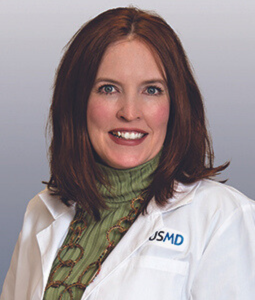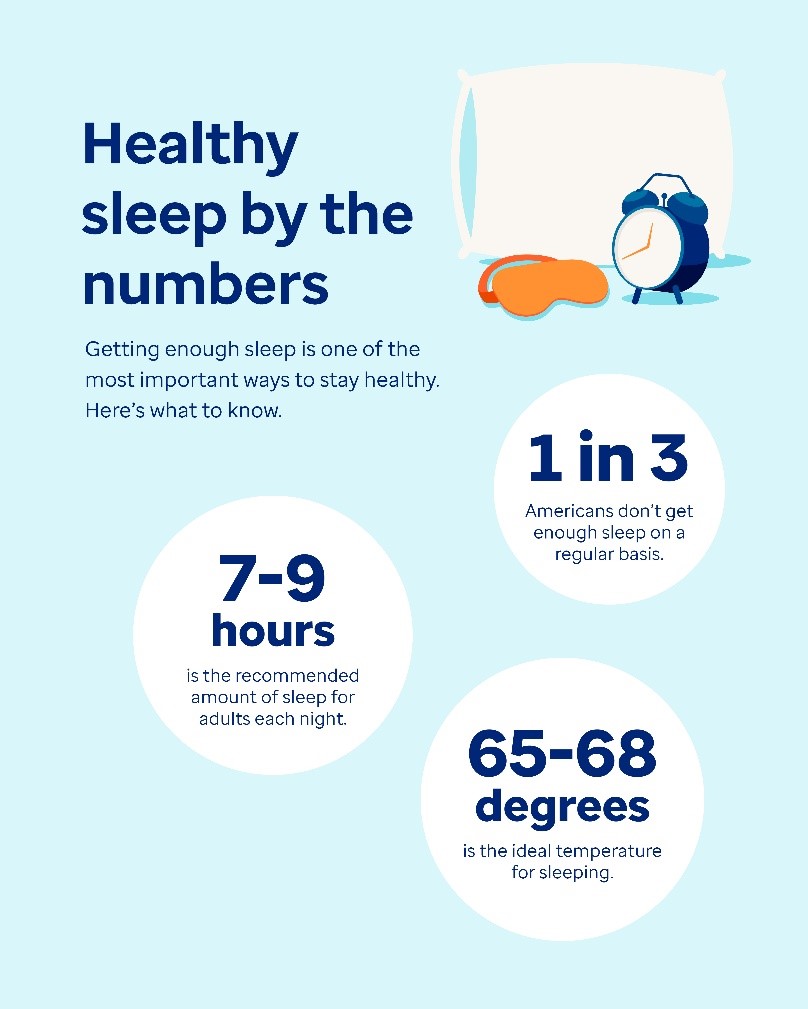
Sleep isn’t just a pause in your day. It’s an essential part of your health and well-being. Learn why a good night’s rest is so important, and get some strategies for sleeping more soundly.

Getting a good night’s sleep seems like it should be so easy. You literally just have to lie in bed and close your eyes. If only. In fact, 1 in 3 Americans don’t get enough z’s on a regular basis. Our busy, stressful lives often get in the way of a good night’s rest.1
But the fact is getting enough sleep is one of the best things you can do for your physical and mental well-being.
What does healthy and not-so-healthy sleep look like? And how can you get the rest you need? Keep reading for all the details.
Why is sleep so important?
It’s easy to think of sleep as downtime. But your body and brain are actually hard at work. Important tasks that keep you healthy happen while you’re asleep.
Blood pressure and levels of stress hormones dip during the night. And blood sugar levels regulate. Plus, your brain uses sleep as a chance to organize information and memories from the day. So you can even get smarter while you snooze.2
“Sleep helps improve our ability to learn while we are awake,” says Ruth Adell, DO. “Having adequate sleep also improves memory, retention and recall.”
Sleep is a must for your overall well-being. (There’s a reason it’s been a vital part of human life for more than 100,000 years.) Not getting enough in the short term can make it hard to focus, think and do everyday tasks.
And chronic lack of sleep can lead to feelings of depression and anxiety. It also raises your risk of heart disease, diabetes, obesity, cancer and dementia (memory loss).2
How does sleep do that? When you don’t get the rest you need, a lot can go wrong and stress your body. Blood pressure levels can go up. Levels of inflammation rise. And blood sugar may be harder to manage. Over time, those changes can lead to disease.
How much sleep do I need?
“Sleep needs varies by stage of life, but 7-8 hours of sleep per night is adequate for most adults,” says Dr. Adell. Take a look:4
- Newborns: 14 – 17 hours (half during naps)
- Infants: 12 – 16 hours (4 – 5 hours during naps)
- Toddlers: 11 – 14 hours (2 – 3 hours during naps)
- Preschoolers: 10 – 13 hours
- Children 6 to 12: 9 – 12 hours
- Teenagers: 8 – 10 hours
- Adults: 7– 9 hours
What is healthy sleep?
A good night’s rest is about more than just being in bed for seven hours or so, though. The quality of sleep you get is also important.
Your brain needs to go through a series of sleep cycles. These cycles help you get the best kind of rest.
You may have heard of rapid eye movement (REM) sleep and non-rapid eye movement (NREM) sleep. During the night, you rotate through 90 to 110-minute cycles of these two stages. The phases of sleep help you feel rested and energized in the morning. On an ideal night, you cycle through each stage of sleep four to six times to get a healthy amount of sleep.3
Sleep is also when your body goes into fix-it mode. Toxins get flushed out, and muscles, bones and other tissues are repaired. Your body also strengthens its ability to fight germs.
Sleep can naturally become more fragmented with age. As a result, older adults may have trouble getting the deep, restful sleep they need. That can make quality rest more challenging, even though the need for it doesn’t change.
“As we age, our sleep patterns change and we may need less sleep. However, sleep deprivation can have a negative impact on our memory,” Dr. Adell shares. “Patients who keep a regular sleep schedule tend to do better than those who do not.”
What habits can support healthy sleep?
For a good night’s sleep, Dr. Adell recommends the following:
Limit or avoid screen time and avoid checking email or social media before bed. The blue, artificial light from phones and laptops decreases melatonin production. Melatonin is a chemical that helps you sleep. Your body naturally makes more of it in the evening and less in the day.
Make your bedroom cool, dark and quiet. The ideal temperature for sleeping is around 65 to 68 degrees. Close the blinds and use earplugs or a white noise app on your phone if sounds tend to wake you up.
Limit alcohol and caffeine close to bedtime. Both can disrupt your natural sleep phases.
Skip big meals at night. That can also mess with your sleep phases and cause heartburn that keeps you up.
Stick to a sleep schedule. Commit to going to bed and waking up around the same time (even on weekends). It regulates your body’s internal clock and makes it easier for you to fall asleep and wake up.
Exercise. Regular activity can prep your body for a good night’s sleep. Experts aren’t sure how this works, but it may help you de-stress so your mind winds down. Plus, exercise is physically tiring.
Reduce stress. If you’ve been awake at 3 a.m. while your brain spins, you know why this is so important. It’s one of the biggest sleep disruptors. To feel calmer in minutes, try these tips.

What should I do if I can’t sleep?
Sleep hygiene is one of Dr. Adell’s favorite topics because sleep makes such a difference in so many aspects of her patients’ health.
If you have a hard time falling asleep right away, Dr. Adell recommends giving yourself 15 minutes, and if you don’t fall asleep, get up and go somewhere else and do something different (not electronics) until you feel tired enough to try again.
You should avoid reading, electronics, and doing anything else in bed that will tell your brain that it should not be sleeping. You want your brain to know that when it is in bed, it is time to sleep. Do not nap during the daytime if you are having difficulty with sleeping at night. You can also try listening to calming music, or turn on a sleep app that guides you through meditation to help you settle down at bedtime.
Although sleep drugs can be used in certain cases, most people do not actually need medication when they practice good sleep hygiene. Dr. Adell advises that sleep drugs can have side effects, like erratic behavior or excessive morning drowsiness, and they increase the risk of falls. Some sleep medications are linked to increased risk of dementia with chronic use. “I caution my patients that some medications are addictive and may cause you to become dependent on them,” she says.
Stress can affect your sleep patterns, so Dr. Adell recommends creating a relaxing bedtime routine, such as taking a warm bath. Learn ways to eliminate stress in your life, because stress can be very disruptive on a conscious or unconscious level.
We all have periods of time when sleep is hard. Life stressors, medication side effects, health issues…. the main thing is to be patient with yourself. Stick with those good sleep hygiene techniques and talk to your primary care provider if problems persist.
Sources:
- Centers for Disease Control and Prevention. Sleep and sleep disorders. Last reviewed April 15, 2020. Accessed August 9, 2022.
- Journal of Clinical Sleep Medicine. Sleep is essential to health: An American Academy of Sleep Medicine position statement. Published October 1, 2021. Accessed August 9, 2022.
- National Library of Medicine. Physiology, sleep stages. Last updated April 28, 2022. Accessed August 9, 2022.
- Centers for Disease Control and Prevention. How much sleep do I need? Last reviewed March 2, 2017. Accessed August 9, 2022.
